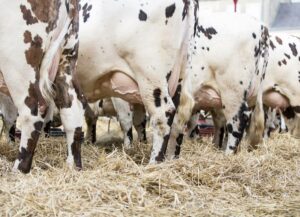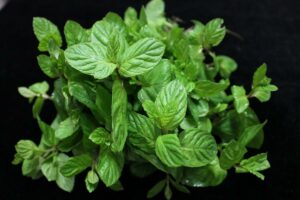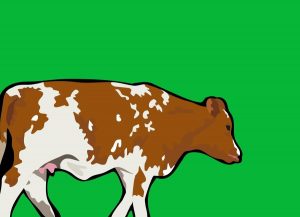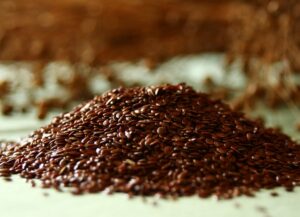Alvaro Garcia
An adequate supply of metabolizable protein to the cow’s intestine can improve income over feed costs in dairy farms. Metabolizable protein is composed of both dietary bypass protein and microbial protein. Some plant-derived chemicals (phytochemicals) can bind protein thus limiting its degradation in the rumen. One example are tannins which create a tannin-protein complex by binding through hydrogen bonds.
These phytochemical protein complexes are stable at the rumen pH but dissociate once they reach the lower pH conditions of the abomasum. This protected protein results in more essential amino acids delivered to the intestine. Other plant compounds which have shown similar properties are Capsicum species which contain capsaicinoids as their active compound, which increase feed intake and modify rumen fermentation. These products increase ruminal volatile fatty acid (VFA) concentration by selectively modifying the rumen microbial populations.
A recent trial (Grazziotin et al., 2020) looked at the effects of tannins and Capsicum in protecting dietary protein from ruminal degradation while modifying rumen fermentation through inhibition of specific rumen microorganisms. The other treatment consisted of a well-known source of bypass protein (soybean meal expeller). Cows in mid lactation were assigned to 1 of 3 groups.
- Basal diet supplemented with solvent-extracted soybean meal (control)
- Basal diet supplemented with pellets including phytochemicals
- Basal diet supplemented with expeller soybean meal
The negative effects of tannins on feed intake have been reported when fed at 1.8% up to 3%. In this experiment the inclusion of the phytochemicals was only at 1.5% of the pellet, and the latter fed at only 4.15% of the diet dry basis. This resulted in a total inclusion of 0.06% of the diet with no effects on intake noted.
Digestibility of dry matter and organic matter were greater in expeller fed cows compared to the other two groups. Cows fed phytochemicals and expeller however digested fiber better than the controls. There were more total rumen VFA in cows fed phytochemicals compared to the control or expeller-fed cows. Acetate however was greater in expeller cows compared to controls and phytochemicals. The acetate to propionate ratio was greater in expeller cows compared to the other two groups. There was consistently less abundance of Selenomonas ruminantium, Succinomonas amylolytica, and Streptococcus bovis in control cows compared to phytochemicals or expeller.
There was a clear effect of tannins-capsicum on milk yield with an increase of 1.7 kg/day in milk production compared to control. Energy corrected milk (39.5 kg/day) and the feed efficiency (ECM/Intake: 1.55) was greater in the cows fed phytochemicals or expeller compared to the control (37.1 kg/day and 1.45).
These phytochemicals added to the diet of dairy cows improved total VFA concentration and propionate by inhibiting bacteria associated with reduced feed efficiency. Results suggest that synchronized feeding of phytochemicals with a high-quality protein source (e.g., soybean meal) promote greater bypass protein, and allow cows to produce similarly compared to soybean meal expeller.
Reference
Grazziotin, R.C.B., Halfen, J., Rosa, F., Schmitt, E., Anderson, J.L., Ballard, V., Osorio, J.S. 2020. Altered rumen fermentation patterns in lactating dairy cows supplemented with phytochemicals improve milk production and efficiency. Journal of dairy science: 103(1): 301-312.
© 2020 Dairy Knowledge Center, LLC. All Rights Reserved.









